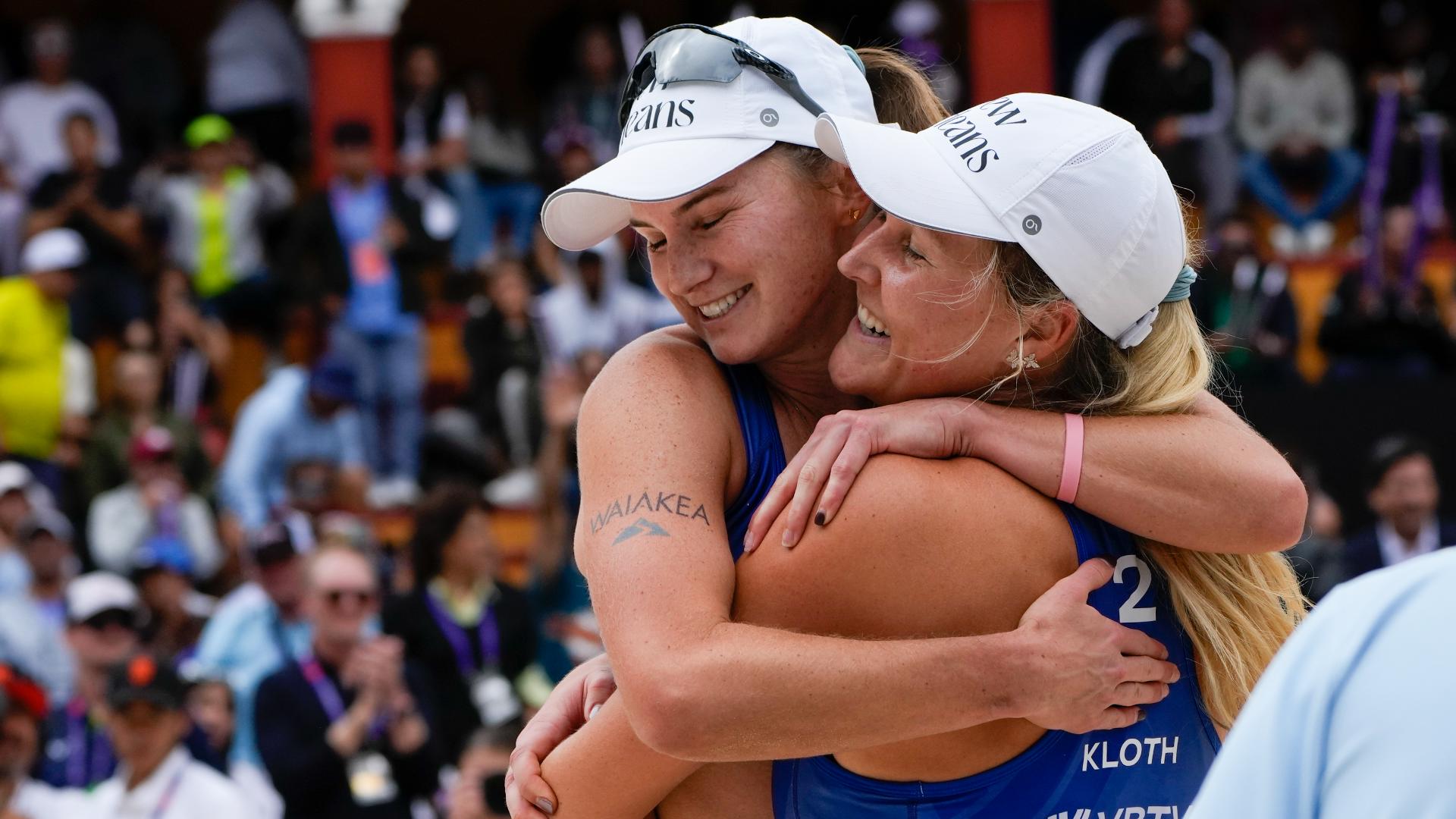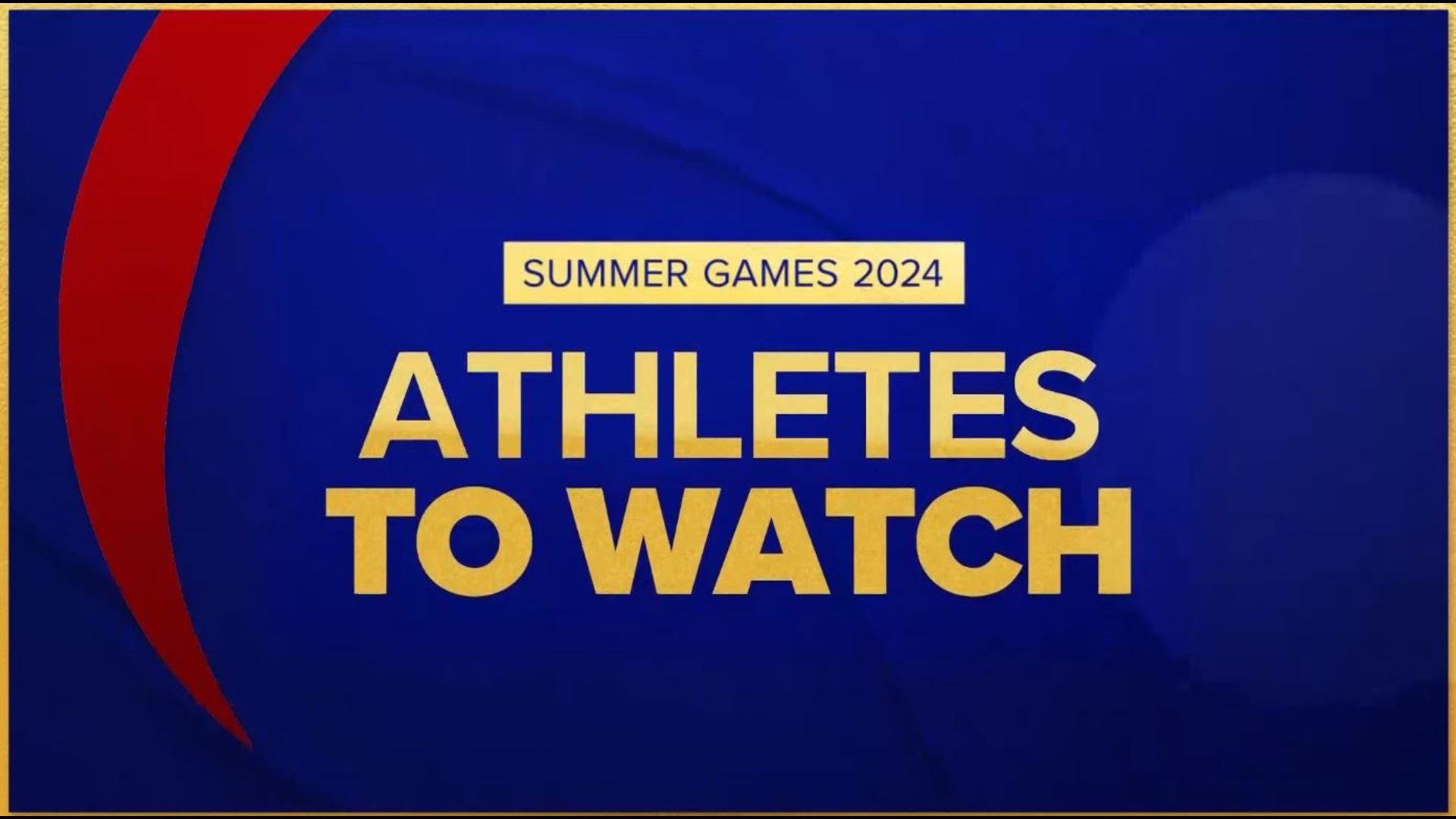PARIS, France — A South Dakota native, Taryn Kloth had never even played beach volleyball until after she graduated from Creighton as a star in the indoor version of the sport. In pursuit of a business degree, she landed at LSU without any beach skills at all.
“I actually got dismantled. I was horrible. I couldn’t even talk and walk in the sand at the same time,” she said. “I just remember going home and calling my parents and I’m like: ‘Oh, my gosh. They should probably kick me off the team.’”
Unlike the generations of Californians who grew up playing volleyball on the local beaches as kids, Kloth and teammate Kristen Nuss came to the sandy side of the sport late. After teaming up at LSU, they stayed in Louisiana, training in Nuss’ hometown of New Orleans.
And when the world's second-ranked team made its debut with a 21-17, 21-14 victory over Canada at Eiffel Tower Stadium in Paris on Saturday night, it was the first American beach volleyball pair ever to go for Olympic gold without any connection to the Golden State.
“We kind of said we wanted to rewrite the script, and kind of change that,” Nuss said in a recent phone interview before the pair departed for Paris. “You had to move out to California. You had to live in California to make it into something in this sport. And I feel like we have really done a good job of kind of changing that.”
Beach volleyball was made for — and made in — California, with its miles of sandy shoreline and weather that allows athletes to play year-round.
The two-person game was invented there, and it has thrived on beaches where volleyball nets welcome professionals and recreational players alike. The Volleyball Walk of Fame on the Manhattan Beach Pier commemorates the winners of the annual tournament there — one of the sport’s most prestigious.
And since the NCAA first sanctioned beach volleyball in 2016, California schools — UCLA and Southern California, to be precise — have won every national championship.
“When people say California is the hotbed of the sport, it really is,” Nuss said. “People grow up going to the beach, playing the sport. People love it there.
“Louisiana was definitely not the hotbed of beach volleyball when I was growing up,” said Nuss, who started playing beach volleyball as a sophomore in high school. “We would almost have to beg other junior teams to play in tournaments, so we could just have a juniors tournament.”
Kloth played indoor volleyball at Creighton in Omaha, Nebraska — another distinctively nonbeach town — and arrived at LSU ready to, and needing to, learn. Her only experience with the beach game was hitting the ball around with friends at a lake back in South Dakota.
“I wouldn’t even call it a beach. I would call it dirt,” she said. “It was like concrete with a little bit of dust on the top of it, and we would just play indoor volleyball outside.”
(Beach volleyball is a totally different sport than the indoor game, with two players on a team instead of six. But the biggest change is going from the hardwood to the flexible surface, which makes running and jumping — any sudden movement, really — a new challenge.)
“When I came on my visit, I didn’t even know where LSU was. I thought it was in New Orleans. I show up in January and what happens a month later? Mardi Gras," Kloth said. “Yeah, I was already thrown into, like, the most Louisiana time ever.”
Kloth managed to master the beach game quickly enough so that by her first full season at LSU in 2020, she went 27-0 with two different partners. In her second year, she and Nuss teamed up to go 36-0 – including a pair of doubleheader victories over UCLA and top-ranked USC.
And by the time she had her degree, Kloth also had acquired enough of a support system to want to stay.
“I was just thrown into this very different culture,” she said. “And they were just very gracious in welcoming me and knowing that I did not have a family here like everybody else probably did.”
So when the time came to move out to California — like every other would-be beach volleyball Olympian the United States has ever produced — they didn't.
Training in New Orleans meant they wouldn't be surrounded by the best competition and all of the resources that California could offer. But Kloth didn't need her MBA to know that it would also be cheaper — an important factor for two people starting out in a sport that can be a tough living.
In Louisiana, though, they had a place to stay and a gym; their coach was local, too.
“For us, our coach was here. We had a place to stay. We had our gym. And I think, for sure, the cost of living was definitely something that steered us away,” Nuss said. “Because it was like: ‘Why? Why would we go pay a large sum of money when we can just stay here?’”
The Americans have dominated Olympic beach volleyball — especially on the women's side, with Misty May-Treanor and Kerri Walsh Jennings winning three straight gold medals from 2004-12 and April Ross and Alix Klineman winning it all in Tokyo three years ago.
Their resumes read like a California atlas: Long Beach, USC, Stanford.
In fact, all 32 pairs the U.S. previously sent to the Summer Games has had some connection to the Golden State.
Nuss and Kloth are hoping to start a new trend.
“They obviously have a great support system where they’re at. And they felt like there’s no need to come to California,” Walsh Jennings, who is in Paris as an analyst, said Friday. "They knew what they wanted and they just went with it.
“When you’re working to become the best in the world, to do it your way, and to do it in a way that is going to serve you and your team best, sometimes people question your judgment. But ultimately, it’s your call," the five-time Olympian said. “And they made the adult and awesome call for themselves.”
► Get breaking news from your neighborhood delivered directly to you by downloading the new FREE WWL-TV News app now in the IOS App Store or Google Play.


